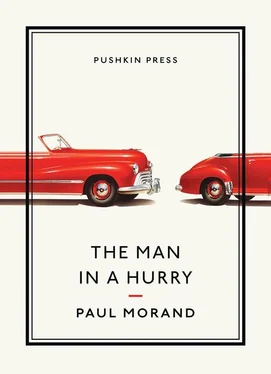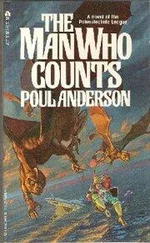“I probably didn’t see the universe looking turbulent because I was looking down on it. We only go fast at ground level. As soon as I step back to take a look at my old planet, it seems dead to me. Speed is a word invented by the earthworm.”
All at once Pierre felt a terrible pain in his left side. He searched for a cause, because he liked to understand in order to guess what might happen next.
“We climbed too quickly,” he thought.
Abruptly, his pulse fluttered and his body grew limp. It seemed to him that a suddenly exposed gun was firing at him from point-blank range. A two-hundred-kilo weight fell on his thoracic cage beneath which he crumpled, as if his ribs, which had become concave, were going to touch his backbone. He wanted to resist this dreadful feeling; the more he tried to expand his chest, the more he felt himself pierced by a burning thrust. It was as though a spear had remained stuck inside his body.
The plane banked to the right and showed its passengers the marvellous sight of the new docks in the Hudson with all the jetties, which resembled the rays of an aureole, whereas the tip of Manhattan, which was made to look as though it was on fire by the setting sun, was dipping its bows like a red-hot iron into a sea streaked with barges, lighters and tugs bewigged with black smoke. Pierre saw nothing; he could no longer breathe or move his neck.
The pain reached his shoulder, passed under his armpit like a sling, and made his arm numb as far as the elbow, as far as his little finger. He sweated, his teeth chattered, his temples were trapped in an iron door that was closing. He had no time to think: “But wait a minute, I’m not going to explode in mid-air,” not even time to call out: “Go down, because I’m dying!”; he would simply pass away in his seat without anyone being aware.
What a comfort it would be if the four engines had suddenly exploded and he had been hurled down from a height of ten thousand feet!
He clenched his teeth, his eyelids, the palms of his hands, the small of his back, his nostrils, his toes; he squeezed one part against the other, just as the oyster clamps its shells tightly against attack from the knife, everything in his body that was paired or twinned. One moment he was bent double and the next he was huddled up and rolled into a ball so as to allow the torture as little surface as possible.
The stewardess, wearing white and heavily made-up, passed down the aisle and brushed against him without him being able to call or cry out, so immobilized was he by a needle of iron, so much did it seem to him that the slightest movement would cause him to break apart, the slightest pause in his resistance smash him against the partition.
Explosions took place one after another inside his head, alarm bells that reduced him to pieces. He pouted so as to keep his lips away from his teeth, which would have sliced them off instantly. Stabbed, battered and ripped apart, his only thought was to curl up small, to huddle up while waiting for the attack to end. Be it life or death, at the point he had reached either could only mean a reduction in his suffering. A paroxysm of this kind does not endure. The organism either yields or it recovers.
All around him, people were exclaiming. The passengers were rushing over to the west side, their faces lit up by the sunset like Sioux wearing warpaint; their gazes were converging below; noses were flattened against the windows the length of the aisle; shrieks of admiration echoed against the metal partitions. Sparks crackled: interviews were being given over the cordless phone.
All of a sudden, Pierre had the impression that rescuers with large shovels were digging him out of the avalanche that had fallen on him. The oxygen was filtering into his lungs once more, his pulse was steadying itself. A moment later, he could even expel the air from his ribs, which could now move again. The spear that had perforated him still hacked into him as it withdrew, but at last it came out. The nails were being removed from his Cross.
He subsided into feelings of well-being and he set foot again among sensations that were unpleasant but ordinary: nausea, headache, intermittent electric shocks in his hands and feet. The shadowy cone which he had entered ebbed away and the light reappeared as soon as he was able to open his eyes.
“Death is a slow and weighty animal,” was his first thought, once he found he was free of pain. “When I almost killed myself in a car at Saint-Vallier, I had already understood this.”
His attack had lasted for quite a while, since the sun had set and the aeroplane was now returning to its base. Wrapped in his overcoat, with his hat over his eyes, no one had noticed him.
The plane was already lowering its undercarriage, rather as pigeons that are about to land on a roof extend their legs, hidden beneath their bellies.
Just as Pierre was setting foot on the cement landing area that was surrounded by reporters, the organizers insisted he say a few words in the microphone about his aerial impressions. Still shaking, still alarmed at having been in such pain, he did not know how to refuse.
“Every time the genius of one man has conquered the inertia of matter, his parents and friends have dismissed him as restless, God has punished him and fate has struck at him. In short, everybody is always in agreement that Prometheus should be chained to his Caucasus, everybody including the vultures and the journalists.”
Nobody understood a thing about these words spoken in a panting voice, in an inarticulate language, by a “French guy” who shuffled from one foot to another like a turkey on a hot plate. But they were taken for enthusiasm.
PIERRE HOPPED ON the first ship leaving for Europe, even though he had booked his cabin on the second.
Curtailing your schedule is unwise: you are greeted by solitude. Not being expected, Pierre found a Paris unconcerned with him, an empty apartment, an absent wife. Not even a note from her. All that the concierge handed to the new arrival was a bundle of administrative bills, each more threatening than the other, and meter readings. Hedwige’s cupboards were empty, she had taken away her dresses, her underwear, her furs. She had never been back. She had had her post forwarded to Saint-Germain.
According to Pierre’s calculations, the birth was due to take place in a fortnight’s time. Separated from the present, evicted from the future, he sat down in the centre of a drawing room that had become as vast as the steppes, feeling astonished at the havoc that absence can bring; his trunks, one tall, the other long, set down their geometrical shapes with complete lack of consideration among the fretted, grumpy-looking armchairs. Picture frames, which can never remain straight, had been cast more askew by the stillness than by any earthquake. Movement can justify disarray, but disorder that is dead is far more distressing than the most inextricable living mess. The gramophone, with its broken records, looked as though it had received a punch from the piano, the telephone cord had become entangled like ivy around the feet of the standard lamp, the inlaid floor panels had become slightly unstuck due to moisture in the ceiling, the ceiling that was “full of ’oles”, as Chantepie would say.
The clutter of objects, the dusty emptiness of this room and the ruined furniture were for Pierre an image of the discord between himself and Hedwige, of the disorder of their love life.
“What would Hedwige say if she were here?” wondered Pierre.
Pierre did not dare call her. He went and prowled around Saint-Germain, waited for her to emerge, and exhausted himself waiting for something that did not happen. He wrote a great deal and sent none of it off.
Читать дальше












